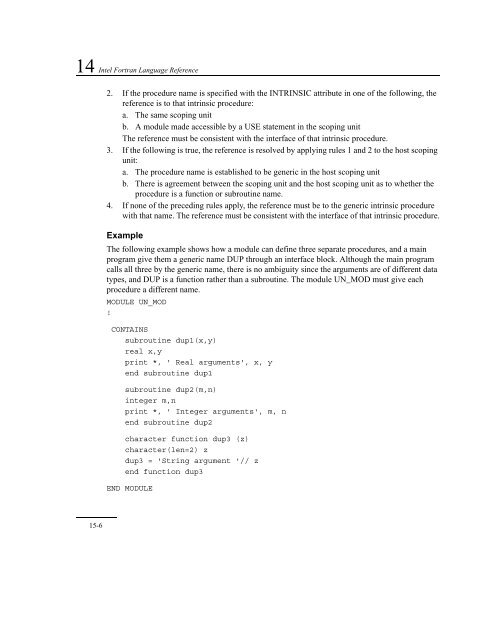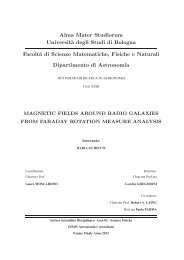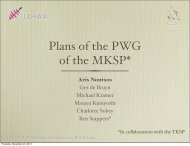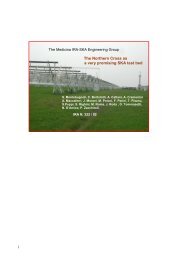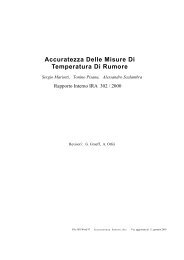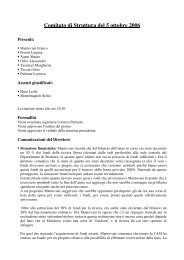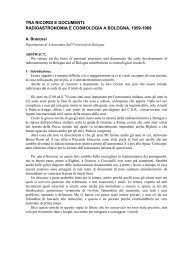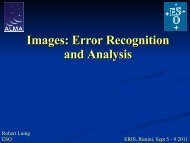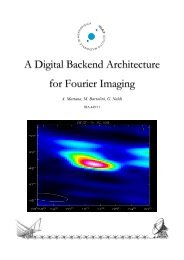- Page 1 and 2:
Intel ® Fortran Language Reference
- Page 3 and 4:
Contents About This Manual Product
- Page 5 and 6:
Contents Variables ................
- Page 7 and 8:
Contents Chapter 6 Chapter 7 Dynami
- Page 9 and 10:
Contents %LOC Function ............
- Page 11 and 12:
Contents DREAL ....................
- Page 13 and 14:
Contents MINLOC ...................
- Page 15 and 16:
Contents Chapter 10 Data Transfer I
- Page 17 and 18:
Contents SP Editing................
- Page 19 and 20:
Contents DISPOSE Specifier ........
- Page 21 and 22:
Contents PSECT Directive ..........
- Page 23 and 24:
Contents Alternative Form for Namel
- Page 25 and 26:
About This Manual This manual conta
- Page 27 and 28:
About This Manual • Links to user
- Page 29 and 30:
About This Manual Most Intel docume
- Page 31 and 32:
About This Manual Intel Fortran Thi
- Page 33 and 34:
About This Manual xxxiii
- Page 35 and 36:
Overview 1 This chapter discusses I
- Page 37 and 38:
Overview 1 • A double colon is no
- Page 39 and 40:
Overview 1 Improved Features The fo
- Page 41 and 42:
Overview 1 • Array operations and
- Page 43 and 44:
Overview 1 • Additional intrinsic
- Page 45 and 46:
Program Structure, Characters, and
- Page 47 and 48:
Program Structure, Characters, and
- Page 49 and 50:
Program Structure, Characters, and
- Page 51 and 52:
Program Structure, Characters, and
- Page 53 and 54:
Program Structure, Characters, and
- Page 55 and 56:
Program Structure, Characters, and
- Page 57 and 58:
Program Structure, Characters, and
- Page 59 and 60:
Program Structure, Characters, and
- Page 61 and 62:
Data Types, Constants, and Variable
- Page 63 and 64:
Data Types, Constants, and Variable
- Page 65 and 66:
Data Types, Constants, and Variable
- Page 67 and 68:
Data Types, Constants, and Variable
- Page 69 and 70:
Data Types, Constants, and Variable
- Page 71 and 72:
Data Types, Constants, and Variable
- Page 73 and 74:
Data Types, Constants, and Variable
- Page 75 and 76:
Data Types, Constants, and Variable
- Page 77 and 78:
Data Types, Constants, and Variable
- Page 79 and 80:
Data Types, Constants, and Variable
- Page 81 and 82:
Data Types, Constants, and Variable
- Page 83 and 84:
Data Types, Constants, and Variable
- Page 85 and 86:
Data Types, Constants, and Variable
- Page 87 and 88:
Data Types, Constants, and Variable
- Page 89 and 90:
Data Types, Constants, and Variable
- Page 91 and 92:
Data Types, Constants, and Variable
- Page 93 and 94:
Data Types, Constants, and Variable
- Page 95 and 96:
Data Types, Constants, and Variable
- Page 97 and 98:
Data Types, Constants, and Variable
- Page 99 and 100:
Data Types, Constants, and Variable
- Page 101 and 102:
Data Types, Constants, and Variable
- Page 103 and 104:
Data Types, Constants, and Variable
- Page 105 and 106:
Data Types, Constants, and Variable
- Page 107 and 108:
Data Types, Constants, and Variable
- Page 109 and 110:
Expressions and Assignment Statemen
- Page 111 and 112:
Expressions and Assignment Statemen
- Page 113 and 114:
Expressions and Assignment Statemen
- Page 115 and 116:
Expressions and Assignment Statemen
- Page 117 and 118:
Expressions and Assignment Statemen
- Page 119 and 120:
Expressions and Assignment Statemen
- Page 121 and 122:
Expressions and Assignment Statemen
- Page 123 and 124:
Expressions and Assignment Statemen
- Page 125 and 126:
Expressions and Assignment Statemen
- Page 127 and 128:
Expressions and Assignment Statemen
- Page 129 and 130:
Expressions and Assignment Statemen
- Page 131 and 132:
Expressions and Assignment Statemen
- Page 133 and 134:
Expressions and Assignment Statemen
- Page 135 and 136:
Expressions and Assignment Statemen
- Page 137 and 138:
Expressions and Assignment Statemen
- Page 139 and 140:
Specification Statements 5 A specif
- Page 141 and 142:
Specification Statements 5 REAL[([K
- Page 143 and 144:
Specification Statements 5 An objec
- Page 145 and 146:
Specification Statements 5 Table 5-
- Page 147 and 148:
Specification Statements 5 When an
- Page 149 and 150:
Specification Statements 5 • “E
- Page 151 and 152:
Specification Statements 5 The arra
- Page 153 and 154:
Specification Statements 5 Assumed-
- Page 155 and 156:
Specification Statements 5 • “U
- Page 157 and 158:
Specification Statements 5 Rules an
- Page 159 and 160:
Specification Statements 5 • “R
- Page 161 and 162:
Specification Statements 5 Named co
- Page 163 and 164:
Specification Statements 5 The foll
- Page 165 and 166:
Specification Statements 5 As a For
- Page 167 and 168:
Specification Statements 5 EQUIVALE
- Page 169 and 170:
Specification Statements 5 INTEGER(
- Page 171 and 172:
Specification Statements 5 Table 5-
- Page 173 and 174:
Specification Statements 5 CHARACTE
- Page 175 and 176:
Specification Statements 5 Figure 5
- Page 177 and 178:
Specification Statements 5 Examples
- Page 179 and 180:
Specification Statements 5 IMPLICIT
- Page 181 and 182:
Specification Statements 5 INTENT(I
- Page 183 and 184:
Specification Statements 5 NAMELIST
- Page 185 and 186:
Specification Statements 5 Rules an
- Page 187 and 188:
Specification Statements 5 For exam
- Page 189 and 190:
Specification Statements 5 Examples
- Page 191 and 192:
Specification Statements 5 MODULE S
- Page 193 and 194:
Specification Statements 5 When a S
- Page 195 and 196:
VOLATILE Attribute and Statement Sp
- Page 197 and 198:
Dynamic Allocation 6 Data objects c
- Page 199 and 200:
Dynamic Allocation 6 See Also •
- Page 201 and 202:
Dynamic Allocation 6 In contrast to
- Page 203 and 204:
Dynamic Allocation 6 Note that when
- Page 205 and 206:
Dynamic Allocation 6 After these st
- Page 207 and 208:
Execution Control 7 A program norma
- Page 209 and 210:
Execution Control 7 label Is the la
- Page 211 and 212:
Execution Control 7 ... ASSIGN 10 T
- Page 213 and 214:
Execution Control 7 If the Value of
- Page 215 and 216:
Execution Control 7 INTEGER L(20) C
- Page 217 and 218:
Execution Control 7 • When the ca
- Page 219 and 220:
Execution Control 7 You cannot use
- Page 221 and 222:
Execution Control 7 CALL SUB_A(Y) E
- Page 223 and 224:
Execution Control 7 END DO The DO b
- Page 225 and 226:
Execution Control 7 DO 100 K=1,50,2
- Page 227 and 228:
Execution Control 7 In a nested DO
- Page 229 and 230:
Execution Control 7 DO WHILE Statem
- Page 231 and 232:
Execution Control 7 Rules and Behav
- Page 233 and 234:
Execution Control 7 Depending on th
- Page 235 and 236:
Execution Control 7 You can include
- Page 237 and 238:
Execution Control 7 Form Example bl
- Page 239 and 240:
Execution Control 7 Effect on Linux
- Page 241 and 242:
Execution Control 7 • Appendix A,
- Page 243 and 244:
Program Units and Procedures 8 A Fo
- Page 245 and 246:
Program Units and Procedures 8 [PRO
- Page 247 and 248:
Program Units and Procedures 8 An a
- Page 249 and 250:
Program Units and Procedures 8 If a
- Page 251 and 252:
Program Units and Procedures 8 •
- Page 253 and 254:
Program Units and Procedures 8 BLOC
- Page 255 and 256:
Program Units and Procedures 8 •
- Page 257 and 258:
Program Units and Procedures 8 Rule
- Page 259 and 260:
Program Units and Procedures 8 See
- Page 261 and 262:
Program Units and Procedures 8 The
- Page 263 and 264:
Program Units and Procedures 8 The
- Page 265 and 266:
Program Units and Procedures 8 RESU
- Page 267 and 268:
Program Units and Procedures 8 The
- Page 269 and 270:
Program Units and Procedures 8 Stat
- Page 271 and 272:
Program Units and Procedures 8 Exte
- Page 273 and 274:
Program Units and Procedures 8 If a
- Page 275 and 276:
Program Units and Procedures 8 Opti
- Page 277 and 278:
Program Units and Procedures 8 If t
- Page 279 and 280:
Program Units and Procedures 8 See
- Page 281 and 282:
Program Units and Procedures 8 See
- Page 283 and 284:
Program Units and Procedures 8 Exam
- Page 285 and 286:
Program Units and Procedures 8 •
- Page 287 and 288:
Program Units and Procedures 8 The
- Page 289 and 290:
Program Units and Procedures 8 INTE
- Page 291 and 292:
Program Units and Procedures 8 •
- Page 293 and 294:
Program Units and Procedures 8 INTE
- Page 295 and 296:
CONTAINS Statement Program Units an
- Page 297 and 298:
Program Units and Procedures 8 ENTR
- Page 299 and 300:
Intrinsic Procedures 9 Intrinsic pr
- Page 301 and 302:
Intrinsic Procedures 9 This chapter
- Page 303 and 304:
Intrinsic Procedures 9 Table 9-2 Ca
- Page 305 and 306:
Intrinsic Procedures 9 Table 9-3 Su
- Page 307 and 308:
Intrinsic Procedures 9 Table 9-3 Su
- Page 309 and 310:
Intrinsic Procedures 9 Table 9-3 Su
- Page 311 and 312:
Intrinsic Procedures 9 Table 9-3 Su
- Page 313 and 314:
Intrinsic Procedures 9 Table 9-4 Sp
- Page 315 and 316:
Intrinsic Procedures 9 Negative int
- Page 317 and 318:
Intrinsic Procedures 9 Class: Argum
- Page 319 and 320:
Intrinsic Procedures 9 Results: The
- Page 321 and 322:
Intrinsic Procedures 9 Specific Nam
- Page 323 and 324:
Intrinsic Procedures 9 Arguments: R
- Page 325 and 326:
Intrinsic Procedures 9 Syntax: resu
- Page 327 and 328:
Intrinsic Procedures 9 PTR => TAR P
- Page 329 and 330:
Intrinsic Procedures 9 ATAN2D ATAND
- Page 331 and 332:
Intrinsic Procedures 9 Results: The
- Page 333 and 334:
Intrinsic Procedures 9 CEILING CHAR
- Page 335 and 336:
Intrinsic Procedures 9 Examples If
- Page 337 and 338:
Intrinsic Procedures 9 CONJG •
- Page 339 and 340:
Intrinsic Procedures 9 Arguments: x
- Page 341 and 342:
Intrinsic Procedures 9 CPU_TIME Exa
- Page 343 and 344:
Intrinsic Procedures 9 CSHIFT (V, S
- Page 345 and 346:
Intrinsic Procedures 9 time (opt) z
- Page 347 and 348:
Intrinsic Procedures 9 Syntax: Clas
- Page 349 and 350:
Intrinsic Procedures 9 Specific Nam
- Page 351 and 352:
Intrinsic Procedures 9 Results: If
- Page 353 and 354:
Intrinsic Procedures 9 EOF Descript
- Page 355 and 356:
Intrinsic Procedures 9 Examples If
- Page 357 and 358:
Intrinsic Procedures 9 Specific Nam
- Page 359 and 360:
Intrinsic Procedures 9 Example CALL
- Page 361 and 362:
Intrinsic Procedures 9 Syntax: Clas
- Page 363 and 364:
Intrinsic Procedures 9 GETARG retur
- Page 365 and 366:
Intrinsic Procedures 9 value (opt)
- Page 367 and 368:
Intrinsic Procedures 9 write (*,*)
- Page 369 and 370:
Intrinsic Procedures 9 Results: The
- Page 371 and 372:
Intrinsic Procedures 9 IBCHNG Descr
- Page 373 and 374:
Intrinsic Procedures 9 Specific Nam
- Page 375 and 376:
Intrinsic Procedures 9 Class: Argum
- Page 377 and 378:
Intrinsic Procedures 9 string subst
- Page 379 and 380:
Intrinsic Procedures 9 Specific Nam
- Page 381 and 382:
Intrinsic Procedures 9 j Must be of
- Page 383 and 384:
Intrinsic Procedures 9 Example Cons
- Page 385 and 386:
Intrinsic Procedures 9 Specific Nam
- Page 387 and 388:
Intrinsic Procedures 9 Syntax: Clas
- Page 389 and 390:
Intrinsic Procedures 9 LEN Descript
- Page 391 and 392:
Intrinsic Procedures 9 Examples LGE
- Page 393 and 394:
Intrinsic Procedures 9 The result i
- Page 395 and 396:
Intrinsic Procedures 9 Specific Nam
- Page 397 and 398:
Intrinsic Procedures 9 Results: The
- Page 399 and 400:
Intrinsic Procedures 9 MAXEXPONENT
- Page 401 and 402:
Intrinsic Procedures 9 MAXLOC (A, D
- Page 403 and 404:
Intrinsic Procedures 9 Examples For
- Page 405 and 406:
Intrinsic Procedures 9 Arguments: a
- Page 407 and 408:
Intrinsic Procedures 9 Examples The
- Page 409 and 410:
Intrinsic Procedures 9 enddo enddo
- Page 411 and 412:
Intrinsic Procedures 9 Example Cons
- Page 413 and 414:
Intrinsic Procedures 9 ! MYPROG.F90
- Page 415 and 416:
Intrinsic Procedures 9 Specific Nam
- Page 417 and 418:
Intrinsic Procedures 9 The result i
- Page 419 and 420:
Intrinsic Procedures 9 PRECISION De
- Page 421 and 422:
Intrinsic Procedures 9 Examples PRO
- Page 423 and 424:
Intrinsic Procedures 9 QFLOAT Descr
- Page 425 and 426:
Intrinsic Procedures 9 Example In R
- Page 427 and 428:
Intrinsic Procedures 9 Arguments: s
- Page 429 and 430:
Intrinsic Procedures 9 Class: Argum
- Page 431 and 432:
Intrinsic Procedures 9 RESHAPE Desc
- Page 433 and 434:
Intrinsic Procedures 9 Results: The
- Page 435 and 436:
Intrinsic Procedures 9 Results: The
- Page 437 and 438:
Intrinsic Procedures 9 Example SHAP
- Page 439 and 440:
Intrinsic Procedures 9 SIN Descript
- Page 441 and 442:
Intrinsic Procedures 9 Arguments: a
- Page 443 and 444:
Intrinsic Procedures 9 Examples SPR
- Page 445 and 446:
Intrinsic Procedures 9 123 C is the
- Page 447 and 448:
Intrinsic Procedures 9 TAND Descrip
- Page 449 and 450:
Intrinsic Procedures 9 Results: The
- Page 451 and 452:
Intrinsic Procedures 9 Element (i,
- Page 453 and 454:
Intrinsic Procedures 9 mask field R
- Page 455 and 456:
Intrinsic Procedures 9 Specific Nam
- Page 457 and 458:
Data Transfer I/O Statements 10 Inp
- Page 459 and 460:
Data Transfer I/O Statements 10 io-
- Page 461 and 462:
Data Transfer I/O Statements 10 If
- Page 463 and 464:
Data Transfer I/O Statements 10 I/O
- Page 465 and 466:
Data Transfer I/O Statements 10 I/O
- Page 467 and 468:
Data Transfer I/O Statements 10 •
- Page 469 and 470:
Data Transfer I/O Statements 10 Exa
- Page 471 and 472:
Data Transfer I/O Statements 10 io-
- Page 473 and 474:
Data Transfer I/O Statements 10 —
- Page 475 and 476:
Data Transfer I/O Statements 10 gro
- Page 477 and 478:
Data Transfer I/O Statements 10 If
- Page 479 and 480:
Data Transfer I/O Statements 10 Arr
- Page 481 and 482:
Data Transfer I/O Statements 10 A d
- Page 483 and 484:
Data Transfer I/O Statements 10 For
- Page 485 and 486:
Data Transfer I/O Statements 10 For
- Page 487 and 488:
Data Transfer I/O Statements 10 See
- Page 489 and 490:
Data Transfer I/O Statements 10 Exa
- Page 491 and 492:
Data Transfer I/O Statements 10 Rul
- Page 493 and 494:
Data Transfer I/O Statements 10 For
- Page 495 and 496:
Data Transfer I/O Statements 10 CHA
- Page 497 and 498:
I/O Formatting 11 A format appearin
- Page 499 and 500:
I/O Formatting 11 When a formatted
- Page 501 and 502:
I/O Formatting 11 PRINT '("NUM can'
- Page 503 and 504:
I/O Formatting 11 r Is a repeat spe
- Page 505 and 506:
I/O Formatting 11 In input records,
- Page 507 and 508:
I/O Formatting 11 Format Value Outp
- Page 509 and 510:
I/O Formatting 11 The field consist
- Page 511 and 512:
I/O Formatting 11 Real data edit de
- Page 513 and 514:
I/O Formatting 11 For the E edit de
- Page 515 and 516:
I/O Formatting 11 EN Editing The EN
- Page 517 and 518:
I/O Formatting 11 Rules for Input P
- Page 519 and 520:
I/O Formatting 11 Table 11-2 Effect
- Page 521 and 522:
I/O Formatting 11 Format Value Outp
- Page 523 and 524:
I/O Formatting 11 Table 11-3 Size L
- Page 525 and 526:
I/O Formatting 11 Terminating Short
- Page 527 and 528:
I/O Formatting 11 Blank interpretat
- Page 529 and 530:
I/O Formatting 11 WRITE (6,99) K 99
- Page 531 and 532:
I/O Formatting 11 On input, when an
- Page 533 and 534:
I/O Formatting 11 The following lin
- Page 535 and 536:
I/O Formatting 11 Although no strin
- Page 537 and 538:
I/O Formatting 11 Variable Format E
- Page 539 and 540:
I/O Formatting 11 Table 11-5 Contro
- Page 541 and 542:
I/O Formatting 11 Example 11-1 Inte
- Page 543 and 544:
File Operation I/O Statements 12 Th
- Page 545 and 546:
File Operation I/O Statements 12
- Page 547 and 548:
File Operation I/O Statements 12 Th
- Page 549 and 550:
INQUIRE Statement File Operation I/
- Page 551 and 552:
File Operation I/O Statements 12 Se
- Page 553 and 554:
File Operation I/O Statements 12 bf
- Page 555 and 556:
File Operation I/O Statements 12 'N
- Page 557 and 558:
File Operation I/O Statements 12 Th
- Page 559 and 560:
File Operation I/O Statements 12 PA
- Page 561 and 562:
File Operation I/O Statements 12 'S
- Page 563 and 564:
File Operation I/O Statements 12 OP
- Page 565 and 566:
File Operation I/O Statements 12 Ta
- Page 567 and 568:
File Operation I/O Statements 12 Th
- Page 569 and 570:
File Operation I/O Statements 12 bl
- Page 571 and 572:
File Operation I/O Statements 12 CA
- Page 573 and 574:
File Operation I/O Statements 12 ..
- Page 575 and 576:
File Operation I/O Statements 12
- Page 577 and 578:
File Operation I/O Statements 12 OR
- Page 579 and 580:
File Operation I/O Statements 12 RE
- Page 581 and 582:
File Operation I/O Statements 12 Wh
- Page 583 and 584:
File Operation I/O Statements 12 'R
- Page 585 and 586:
File Operation I/O Statements 12 RE
- Page 587 and 588:
Compilation Control Statements 13 I
- Page 589 and 590:
Compilation Control Statements 13 E
- Page 591 and 592:
Directive Enhanced Compilation 14 D
- Page 593 and 594:
Directive Enhanced Compilation 14
- Page 595 and 596:
Directive Enhanced Compilation 14 O
- Page 597 and 598:
Directive Enhanced Compilation 14 a
- Page 599 and 600:
Directive Enhanced Compilation 14
- Page 601 and 602:
Directive Enhanced Compilation 14 a
- Page 603 and 604:
Directive Enhanced Compilation 14
- Page 605 and 606:
Directive Enhanced Compilation 14 A
- Page 607 and 608:
Directive Enhanced Compilation 14 S
- Page 609 and 610:
Directive Enhanced Compilation 14 D
- Page 611 and 612:
Directive Enhanced Compilation 14 F
- Page 613 and 614:
Directive Enhanced Compilation 14 Y
- Page 615 and 616:
Directive Enhanced Compilation 14 R
- Page 617 and 618:
Directive Enhanced Compilation 14 M
- Page 619 and 620: Directive Enhanced Compilation 14 I
- Page 621 and 622: Directive Enhanced Compilation 14 N
- Page 623 and 624: Directive Enhanced Compilation 14 !
- Page 625 and 626: Directive Enhanced Compilation 14 E
- Page 627 and 628: Directive Enhanced Compilation 14 I
- Page 629 and 630: Directive Enhanced Compilation 14 T
- Page 631 and 632: Directive Enhanced Compilation 14 b
- Page 633 and 634: Directive Enhanced Compilation 14 C
- Page 635 and 636: Directive Enhanced Compilation 14
- Page 637 and 638: Directive Enhanced Compilation 14 T
- Page 639 and 640: Directive Enhanced Compilation 14 W
- Page 641 and 642: Directive Enhanced Compilation 14 T
- Page 643 and 644: Directive Enhanced Compilation 14
- Page 645 and 646: Directive Enhanced Compilation 14 I
- Page 647 and 648: Directive Enhanced Compilation 14 R
- Page 649 and 650: Directive Enhanced Compilation 14 T
- Page 651 and 652: Directive Enhanced Compilation 14 c
- Page 653 and 654: Directive Enhanced Compilation 14 R
- Page 655 and 656: Directive Enhanced Compilation 14
- Page 657 and 658: Directive Enhanced Compilation 14 c
- Page 659 and 660: Directive Enhanced Compilation 14 c
- Page 661 and 662: Directive Enhanced Compilation 14 S
- Page 663 and 664: Directive Enhanced Compilation 14 A
- Page 665 and 666: Scope and Association 15 Scope Prog
- Page 667 and 668: Scope and Association 14 Table 15-1
- Page 669: Scope and Association 14 • Within
- Page 673 and 674: Scope and Association 14 1. If both
- Page 675 and 676: Scope and Association 14 Execution
- Page 677 and 678: Scope and Association 14 When a poi
- Page 679 and 680: Scope and Association 14 Table 15-2
- Page 681 and 682: Deleted and Obsolescent Language Fe
- Page 683 and 684: Deleted and Obsolescent Language Fe
- Page 685 and 686: Additional Language Features B To f
- Page 687 and 688: Additional Language Features B Exam
- Page 689 and 690: Additional Language Features B FIND
- Page 691 and 692: Additional Language Features B EXTE
- Page 693 and 694: Additional Language Features B expr
- Page 695 and 696: Alternative Syntax for the DELETE S
- Page 697 and 698: Additional Language Features B •
- Page 699 and 700: Additional Language Features B Stru
- Page 701 and 702: Additional Language Features B Figu
- Page 703 and 704: Additional Language Features B See
- Page 705 and 706: Additional Language Features B Figu
- Page 707 and 708: Additional Language Features B You
- Page 709 and 710: Additional Language Features B Exam
- Page 711 and 712: The ASCII Character Set for Linux S
- Page 713 and 714: The ASCII Character Set for Linux S
- Page 715 and 716: Data Representation Models D Severa
- Page 717 and 718: Data Representation Models D i= (-
- Page 719 and 720: Run-Time Library Routines E Intel®
- Page 721 and 722:
Run-Time Library Routines E Table E
- Page 723 and 724:
Run-Time Library Routines E Table E
- Page 725 and 726:
Run-Time Library Routines E Table E
- Page 727 and 728:
Run-Time Library Routines E Table E
- Page 729 and 730:
Run-Time Library Routines E Table E
- Page 731 and 732:
Run-Time Library Routines E Table E
- Page 733 and 734:
Run-Time Library Routines E QuickWi
- Page 735 and 736:
Run-Time Library Routines E Table E
- Page 737 and 738:
Run-Time Library Routines E Table E
- Page 739 and 740:
Run-Time Library Routines E Table E
- Page 741 and 742:
Run-Time Library Routines E Table E
- Page 743 and 744:
Run-Time Library Routines E USE IFA
- Page 745 and 746:
Run-Time Library Routines E Table E
- Page 747 and 748:
Summary of Language Extensions F Th
- Page 749 and 750:
Summary of Language Extensions F
- Page 751 and 752:
Summary of Language Extensions F
- Page 753 and 754:
Summary of Language Extensions F
- Page 755 and 756:
Summary of Language Extensions F JI
- Page 757 and 758:
Glossary This glossary contains ter
- Page 759 and 760:
Glossary array pointer A pointer to
- Page 761 and 762:
Glossary bit field A contiguous gro
- Page 763 and 764:
Glossary compilation unit The sourc
- Page 765 and 766:
Glossary data item A unit of data (
- Page 767 and 768:
Glossary derived type A data type t
- Page 769 and 770:
Glossary end-of-file The condition
- Page 771 and 772:
Glossary file access The way record
- Page 773 and 774:
Glossary H handle A value (often, b
- Page 775 and 776:
Glossary interface block The sequen
- Page 777 and 778:
Glossary listing A printed copy of
- Page 779 and 780:
Glossary module procedure A subrout
- Page 781 and 782:
Glossary operand The passive elemen
- Page 783 and 784:
Glossary • A constant subobject (
- Page 785 and 786:
Glossary • For a data object, the
- Page 787 and 788:
Glossary seed A value (which can be
- Page 789 and 790:
Glossary statement keyword A word t
- Page 791 and 792:
Glossary substring A contiguous por
- Page 793 and 794:
Glossary use association The proces
- Page 795 and 796:
Index Symbols ! See Exclamation poi
- Page 797 and 798:
Index ALIGN option for ATTRIBUTES d
- Page 799 and 800:
Index ARRAY_VISUALIZER option for A
- Page 801 and 802:
Index ATAN2 function, 9-30 ATAN2D f
- Page 803 and 804:
Index Block IF statement, 7-26 See
- Page 805 and 806:
Index cDEC$ VECTOR UNALIGNED direct
- Page 807 and 808:
Index scope of, 15-2 variables in,
- Page 809 and 810:
Index integer, 3-4 literal, 3-1 log
- Page 811 and 812:
Index Data abstraction example of,
- Page 813 and 814:
Index union, B-19 DECLARE directive
- Page 815 and 816:
Index NODECLARE, 14-17 NOFREEFORM,
- Page 817 and 818:
Index logical, 11-25 real and compl
- Page 819 and 820:
Index EXTERNAL attribute and statem
- Page 821 and 822:
Index definition of, 11-2 examples
- Page 823 and 824:
Index VECTOR ALWAYS (i32), 14-42 VE
- Page 825 and 826:
Index definition of, 10-4 inquiring
- Page 827 and 828:
Index NAMED specifier in, 12-15 NEX
- Page 829 and 830:
Index scope of, 15-2 Internal READ
- Page 831 and 832:
Index KIDNNT function, 9-116 KIEOR
- Page 833 and 834:
Index Logical I/O units, 10-4 See a
- Page 835 and 836:
Index MODULE statement, 8-4 example
- Page 837 and 838:
Index Nonexecutable statements, 2-2
- Page 839 and 840:
Index data scope attribute clauses
- Page 841 and 842:
Index assigning values to targets o
- Page 843 and 844:
Index Pure procedures, 8-14 example
- Page 845 and 846:
Index EN, 11-19 ES, 11-20 F, 11-15
- Page 847 and 848:
Index Result variables in ENTRY sta
- Page 849 and 850:
Index SHARED specifier in OPEN stat
- Page 851 and 852:
Index EQUIVALENCE, 5-29 executable
- Page 853 and 854:
Index See also Internal subprograms
- Page 855 and 856:
Index pointer NULL, 9-118 TRANSPOSE
- Page 857 and 858:
Index VECTOR UNALIGNED directive (i


